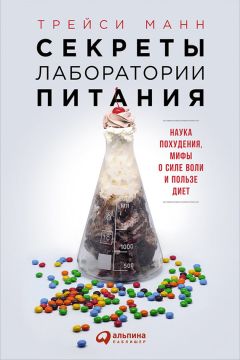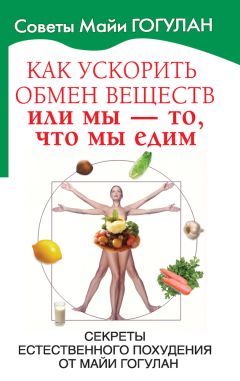Трейси Манн - Секреты лаборатории питания. Наука похудения, мифы о силе воли и пользе диет
87. Lisa L. Ioannides-Demos et al., “Safety of Drug Therapies Used for Weight Loss and Treatment of Obesity”, Drug Safety 29, no. 4 (2006): 277-302, doi: 10.2165/00002018-200629040-00001.
88. M. A. Whisman, “Loneliness and the Metabolic Syndrome in a Population-Based Sample of Middle-Aged and Older Adults”, Health Psychology 29, no. 5 (2010): 550-54, doi:10.1037/a0020760.
89. J. Holt-Lunstad, T. B. Smith, and J. B. Layton, “Social Relationships and Mortality Risk: A Meta-Analytic Review”, PLoS Med 7, no. 7 (2010): el000316,doi:10.1371/journal.pmed. 1000316.
90. Сведения взяты из дополнительных материалов к статье. Вебадреса, по которому можно выйти на эти данные, не существует, но их можно найти в основной статье: Flegal et al., “Association of All-Cause Mortality with Overweight and Obesity Using Standard Body Mass Index Categories”.
91. Исследователям нужно было учитывать как минимум два из трех компонентов СЭС (например, уровни образования и дохода), если судить по работе: Р. A. Braveman et al., “Socioeconomic Status in
Health Research: One Size Does Not Fit All”, JAMA 294, no. 22 (2005): 2879-88, doi:10.1001/jama.294.22.2879.
92. Это справедливо для белокожих людей, которые никогда не курили. Eric A. Finkelstein et al., “Individual and Aggregate Years-of-Life-Lost Associated with Overweight and Obesity”, Obesity 18, no. 2 (February 2010): 333-39, doi:10.1038/oby.2009.253.
93. Там же.
94. Christenfeld, Phillips, and Glynn, “What’s in a Name”.
95. P. Campos et al., “The Epidemiology of Overweight and Obesity: Public Health Crisis or Moral Panic?”, International Journal of Epidemiology 35, no. 1 (2006): 55-60, doi:10.1093/ije/dyi254.
96. Davidoff, “Sponsorship, Authorship, and Accountability”.
97. Olshansky et al., “A Potential Decline in Life Expectancy in the United States in the 21st Century”.
98. W. Wayt Gibbs, “Obesity: An Overblown Epidemic?”, Scientific American 292, no. 6 (June 2005): 70-77, doi:10.1038/scientificamerican0605-70.
99. Olshansky et al., “A Potential Decline in Life Expectancy in the United States in the 21st Century”; David Allison, “Disclosure of Financial Information”, New England Journal of Medicine, 2005, http://www. nejm.org/doi/suppl/10.1056/NEJMsr043743/suppl_file/1138sal.pdf.
100. Flegal et al., “Association of All-Cause Mortality with Overweight and Obesity Using Standard Body Mass Index Categories”.
ГЛАВА 6. НЕСКОЛЬКО УРОКОВ ОТ ПОДЖАРОЙ СВИНЬИ1. По просьбе этого человека в книге его имя изменено.
2. Walter Mischel, “From Good Intentions to Willpower”, in “The Psychology of Action: Linking Cognition and Motivation to Behavior”, ed. Peter Gollwitzer and John Bargh (New York: Guilford Press, 1996), 197-218.
3. Об этой стратегии (и о многих других) мы писали в работе, посвященной обзору стратегий самоконтроля: Traci Mann, Denise de Ridder, and Kentaro Fujita, “Self-Regulation of Health Behavior: Social Psychological Approaches to Goal Setting and Goal Striving”, Health Psychology 32, no. 5 (May 2013): 487-98, doi:10.1037/a0028533.
4. Lisa R. Young and Marion Nestle, “The Contribution of Expanding Portion Sizes to the US Obesity Epidemic”, American Journal of Public Health 92, no. 2 (February 1, 2002): 246-49.
5. Там же.
6. Nancy Rivera, “Ice Cream Firm Turns 40: Baskin-Robbins Starts Program to Revitalize”, Los Angeles Times, May 6, 1985.
7. Young and Nestle, “The Contribution of Expanding Portion Sizes to the US Obesity Epidemic”.
8. Там же.
9. В. Wansink and C. S. Wansink, “The Largest Last Supper: Depictions of Food Portions and Plate Size Increased Over the Millennium”, International Journal of Obesity (2005) 34, no. 5 (May 2010): 943 -4, doi: 10.1038/ijo.2010.37.
10. Там же.
11. Сведения обзорного характера можно найти в работе: Brian Wansink, “Environmental Factors That Increase the Food Intake and Consumption Volume of Unknowing Consumers”, Annual Review of Nutrition 24 (January 2004): 455-79, doi:10.1146/annurev.nutr.24.012003.132140. См. также: Carmen Piernas and Barry M. Popkin, “Increased Portion Sizes from Energy-Dense Foods Affect Total Energy Intake at Eating Occasions in US Children and Adolescents: Patterns and Trends by Age Group and Sociodemographic Characteristics, 1977-2006”, American Journal of Clinical Nutrition 94, no. 5 (November 1, 2011): 1324-32, doi: 10.3945/ajcn.110.008466; David A. Levitsky and Trisha Youn, “The More Food Young Adults Are Served, the More They Overeat”, Journal of Nutrition 134, no. 10 (October 1, 2004): 2546-49.
12. Brian Wansink, “Can Package Size Accelerate Usage Volume?”, Journal of Marketing 60, no. 3 (1996): 1-14, doi: 10.2307/1251838.
13. Brian Wansink, Koert van Ittersum, and James E. Painter, “Ice Cream Illusions: Bowls, Spoons, and Self-Served Portion Sizes”, American Journal of Preventive Medicine 31, no. 3 (2006): 240-43.
14. Ellen van Kleef, Christos Kawouris, and Hans С. M. van Trijp, “The Unit Size Effect of Indulgent Food: How Eating Smaller Sized Items Signals Impulsivity and Makes Consumers Eat Less”, Psychology & Health 29, no. 9 (September 2014): 1081-1103, doi: 10.1080/08870 446.2014.909426.
15. Brian Wansink, James E. Painter, and Jill North, “Bottomless Bowls: Why Visual Cues of Portion Size May Influence Intake”, Obesity Research 13, no. 1 (January 2005): 93-100, doi:10.1038/oby.2005.12.
16. Там же.
17. В. Wansink and К. Van Ittersum, “Illusive Consumption Behavior and the DelBoeuf Illusion: Are the Eyes Really Bigger than the Stomach?”, Annual Review of Nutrition 24 (2004): 455-79.
18. Wansink, Painter, and North, “Bottomless Bowls”.
19. Piernas and Popkin, “Increased Portion Sizes from Energy-Dense Foods Affect Total Energy Intake at Eating Occasions in US Children and Adolescents”.
20. Frank McIntyre, “U.S. Companies Shrink Packages as Food Prices Rise”, Daily Finance, 2011, http://www.dailyfinance.com/2011/04/04/u-s-companies-shrink-packages-as-food-prices-rise/.
21. “Saving on Toilet Paper” , OccupiedLife.com, 2011, http://occupiedlife. com/saving-on-toilet-paper/; Peggy Wang, “46 Penny-Pinching Ways to Save a Lot of Money This Year,” Buzzfeed.com, 2013, http://www.buzzfeed. com/peggy/46-penny-pinching-ways-to-save-a-lot-of-money-this.
22. Keith Hawton et al., “Long Term Effect of Reduced Pack Sizes of Paracetamol on Poisoning Deaths and Liver Transplant Activity in England and Wales: Interrupted Time Series Analyses”, BMJ (Clinical Research Ed.) 346 (January 2013): f403; K. Hawton, “Effects of Legislation Restricting Pack Sizes of Paracetamol and Salicylate on Self Poisoning in the United Kingdom: Before and After Study”, BMJ 322, no. 7296 (May 19, 2001): 1203, doi:10.1136/bmj.322.7296.1203.
23. Josje Maas et al., “Do Distant Foods Decrease Intake? The Effect of Food Accessibility on Consumption”, Psychology & Health 27, Suppl. 2 (October 2012): 59-73, doi: 10.1080/08870446.2011.565341. См. также: Gregory J. Privitera and Far is M. Zuraikat, “Proximity of Foods in a Competitive Food Environment Influences Consumption of a Low Calorie and a High Calorie Food”, Appetite 76 (May 2014): 175-79, doi:10.1016/j.appet.2014.02.004.
24. Maas et al., “Do Distant Foods Decrease Intake?”.
25. Paul Rozin et al., “Nudge to Nobesity I: Minor Changes in Accessibility Decrease Food Intake”, Judgment and Decision Making 6, no. 4 (2011): 323-32.
26. Насколько я знаю, никто не проводил подобный эксперимент, поэтому это только предположение.
27. См., например: Frances Martel, “Jon Stewart Rails Against Bloomberg’s ‘Draconian’ Soda Ban with Piles of Gross ‘Legal’ Food”, Mediaite. com, 2012, http://www.mediaite.com/tv/jon-stewart-rails-against-bloombergs-draconian-soda-ban-with-piles-of-gross-legal-food/.
28. Cecilia Kang, “Google Crunches Data on Munching in Office”, Washington Post, September 1, 2013. См. также: В. Wansink, J. E. Painter, and Y. K. Lee, “The Office Candy Dish: Proximity’s Influence on Estimated and Actual Consumption”, International Journal of Obesity 30, no. 5 (May 17, 2006): 871-75, doi:10.1038/sj.ijo.0803217; James E. Painter, Brian Wansink, and Julie B. Hieggelke, “How Visibility and Convenience Influence Candy Consumption”, Appetite 38, no. 3 (June 2002): 237-38, doi:10.1006/appe.2002.0485.
29. Carol E. Cornell, Judith Rodin, and Harvey Weingarten, “Stimulus-Induced Eating When Satiated”, Physiology & Behavior 45, no. 4 (1989): 695-704.
30. Если хотите вдохновиться на подобное, то существует видео, в котором повар и писательница Тамар Адлер за один раз моет и поджаривает огромное количество овощей, а потом кладет их в банки и убирает в холодильник, чтобы в течение недели съесть в сыром виде или пустить в готовку (лучше увидеть это своими глазами). Tamar Е. Adler, “How to Stride Ahead: Part 2”,Tamareadler. com, 2011, http://www.tamareadler.com/2011/10/10/how-to-stride-ahead-part-2/.
31. Имеются в виду Джо Редден, Зата Викерс, Марла Рейке и Элтон Майкерези, а также аспиранты: Стефания Элсберндт и Никки Миллер.
32. Подробнее об этих экспериментах см.: Joseph Р. Redden et al., “The Effect of Juxtaposition on the Intake of Healthy Foods” (n.d.).
ГЛАВА 7. КАК ЗАСТАВИТЬ ДРУЗЕЙ ИГНОРИРОВАТЬ ПЕЧЕНЬЕ1. Solomon Е. Asch, “Studies of Independence and Conformity:
I. A Minority of One against a Unanimous Majority”, Psychological Monographs: General and Applied 70, no. 9 (1956) 1-70.
2. Эксперимент воспроизводился более 100 раз в 17 разных странах. Подробнее см.: Rod Bond and Peter В. Smith, “Culture and Conformity: A Meta-Analysis of Studies Using Asch’s (1952b, 1956) Line Judgment Task”, Psychological Bulletin 119, no. 1 (1996): 111-37.
3. M. Sherif, “The Psychology of Social Norms” (Oxford, England: Harper, 1936).
4. Paul Rozin, “The Integration of Biological, Social, Cultural and Psychological Influences on Food Choice”, in “The Psychology of Food
Choice”, ed. Richard Shepherd and Monique Raats (Oxfordshire, England: CABI, 2006), 19^10.
5. John M. de Castro and E. Marie Brewer, “The Amount Eaten in Meals by Humans Is a Power Function of the Number of People Present”, Physiology & Behavior 51, no. 1 (1992): 121-25.
6. Там же; A. Ward and T. Mann, “Don’t Mind If I Do: Disinhibited Eating Under Cognitive Load”, Journal of Personality and Social Psychology 78, no. 4 (April 2000): 753-63.
7. Vanessa I. Clendenen, C. Peter Herman, and Janet Polivy, “Social Facilitation of Eating among Friends and Strangers”, Appetite 23, no. 1 (1994): 1-13; Sarah-Jeanne Salvy et al., “Effects of Social Influence on Eating in Couples, Friends and Strangers”, Appetite 49, no. 1 (July 2007): 92-99, doi:10.1016/j.appet.2006.12.004.
8. De Castro and Brewer, “The Amount Eaten in Meals by Humans Is a Power Function of the Number of People Present”.
9. Maryhope Howland, Jeffrey M. Hunger, and Traci Mann, “Friends Don’t Let Friends Eat Cookies: Effects of Restrictive Eating Norms on Consumption among Friends”, Appetite 59, no. 2 (October 2012): 505-9, doi:10.1016/j.appet.2012.06.020.
10. Leon Festinger, “A Theory of Social Comparison Processes”, Human Relations 7, no. 2 (1954): 117-40.
11. Noah J. Goldstein, Robert B. Cialdini, and Vladas Griskevicius, “A Room with a Viewpoint: Using Social Norms to Motivate Environmental Conservation in Hotels”, Journal of Consumer Research 35, no. 3 (October 3, 2008): 472-82, doi: 10.1086/586910.
12. Значимы и другие факторы, например выгодность или необходимость прикладывать усилия, но даже с их учетом можно выявить очевидные различия между странами. Eric J. Johnson and Daniel Goldstein, “Do Defaults Save Lives?”, Science 302, no. 5649 (November 21, 2003): 1338-39, doi:10.1126/science.l091721.
13. Ervin Staub, “Instigation to Goodness: The Role of Social Norms and Interpersonal Influence”, Journal of Social Issues 28, no. 3 (July 1972): 131-50, doi: 10.1111/j.1540-4560.1972.tb00036.x.
14. Howland, Hunger, and Mann, “Friends Don’t Let Friends Eat Cookies”. Другие исследования также демонстрируют воздействие подразумеваемых норм на питание. См., например: Eric Robinson, Helen Benwell, and Suzanne Higgs, “Food Intake Norms Increase and Decrease Snack Food Intake in a Remote Confederate Study”, Appetite 65 (2013): 20-24. Обзор можно найти в работе: Eric Robinson et al., “What
Everyone Else Is Eating: A Systematic Review and Meta-Analysis of the Effect of Informational Eating Norms on Eating Behavior”, Journal of the Academy of Nutrition and Dietetics 114, no. 3 (2013): 414-29.
15. F. Marijn Stok et al., “Minority Talks: The Influence of Descriptive Social Norms on Fruit Intake”, Psychology & Health 27, no. 8 (January 2012): 956-70, doi: 10.1080/08870446.2011.635303.




